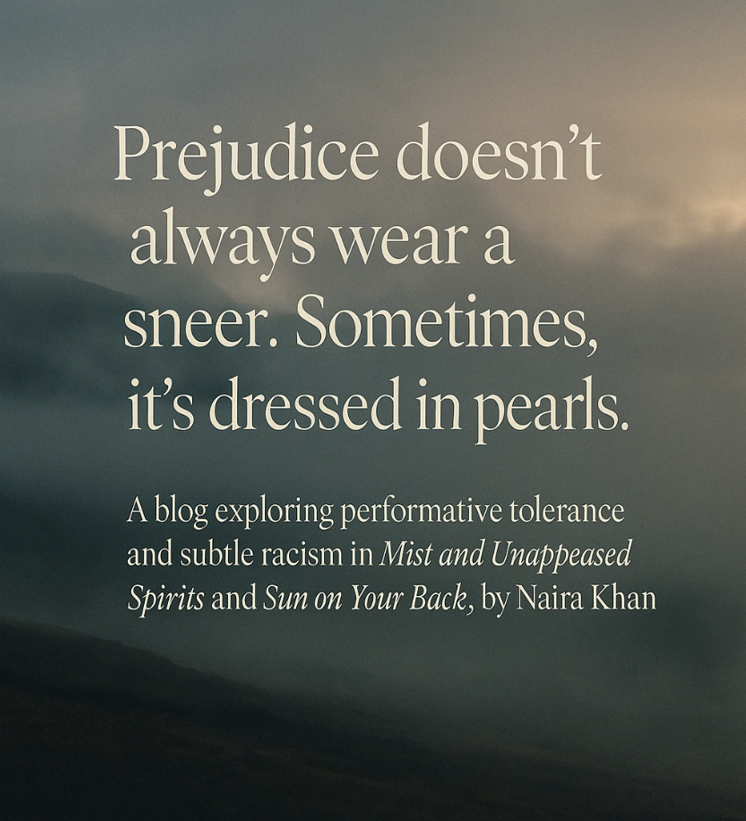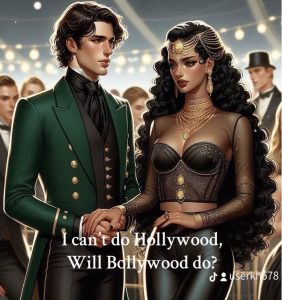Lady Robertson and Performative Prejudice in Mist and Unappeased Spirits

Meta Description:
Explore subtle racism, Islamophobia, and class bias in Mist and Unappeased Spirits through the character of Lady Robertson. A cross-novel reflection on women of colour navigating love, identity, and conditional acceptance.
URL Slug: lady-robertson-prejudice-mist-unappeased-spirits
Target SEO Keywords:
Muslim woman protagonist, subtle racism in fiction, Islamophobia in literature, prejudice and privilege, interracial love story, fiction exploring race and class, women of colour in fiction
“I can understand William’s fascination with you. You are exotic, I suppose.”
— Lady Robertson to Ara, Mist and Unappeased Spirits
In Mist and Unappeased Spirits, prejudice doesn’t always wear a sneer. Sometimes, it’s cloaked in civility, dressed in fine pearls, and delivered with a smile just sharp enough to cut.
Lady Robertson measures, judges, and subtly diminishes Ara’s presence from the moment they meet. She’s praised with coded language, complimented in a way that marks her as different—never quite belonging.
At Tristan’s birthday party, Ara captivates the room with a soulful performance of “You’ve Lost That Loving Feeling.” Emily beams with pride. The soulful performance entrances William. The crowd adores her. But Lady Robertson watches from the sidelines, her approval absent even as she wears the mask of politeness.

When the opportunity arises, she quietly delivers her verdict:
“You are exotic… not really what he is used to.”
It’s not meant as a compliment. It’s a warning.
Politeness as a Weapon
Lady Robertson’s subtle digs escalate. Ara’s love for William is questioned, her motives dissected. She’s accused of taking advantage of William’s vulnerable state following his brain injury. Even worse, she’s ominously linked to terrorism:
“Locals may not want to support him if they have any doubts about his life partner… and her link to terrorism.”
Ara doesn’t retaliate with rage. She responds with calm dignity:
“I’m afraid your titles and estates mean nothing to me. Nor am I impressed by them. So don’t consider me an obstacle to your map for William’s future.”
That refusal to bow is what makes Ara such a powerful protagonist.
When Prejudice Turns Violent
When William disappears on Mount Nyangani, Lady Robertson’s restraint vanishes. Grief exposes truth. The quiet hostility becomes a full-blown attack.
“These people – they are all terrorists. They have taken my William!”
She screams, grabs Ara by the front of her pyjamas, and rips off the engagement ring William had given her.
It’s a shattering scene—not because it’s unexpected, but because it confirms what was always lurking beneath Lady Robertson’s smooth exterior. It’s Islamophobia, racism, and classism—undiluted and undisguised.
A Performance of Grace
But when William is found alive and reaffirms his love for Ara, Lady Robertson quickly changes her stance. Instantly. They arranged an engagement party. Smiles return. The performance resumes.
But we, as readers, know better. She doesn’t earn acceptance—she performs it.
This is the danger of performative tolerance: prejudice doesn’t disappear. It just waits for the next crack in the veneer.
Across Time and Borders: From Ara to Diara
Ara isn’t the only woman in my fiction to face this quiet exclusion. In Sun on Your Back, Diara Kruger—a woman of colour born to a Muslim mother and Christian father—navigates love and prejudice in racially segregated Southern Africa.
From being served through a side hatch because she was “too dark” to watching her university crush choose a white woman with colonial pride, Diara’s world is one of smiling brutality. At a party, she and her friend are called “kaffir bitches”—a violent reminder that no matter how educated or charming she is, the world around her still defines her by race.
Years later, Diara confronts her former love interest, Xander:
“Did it have anything to do with the fact that I was brown?”
“I’m ashamed to say that perhaps it did, to some extent,” he replies.
It’s an admission Ara never receives. But the surrounding silence, the conditions of her acceptance, speaks just as loudly.
Why These Stories Matter?
Ara and Diara live on different continents. But both are women of colour, facing judgment, navigating relationships loaded with historical weight, and choosing dignity when the world offers anything but.
As the author, I wanted readers to experience the emotional weight of being both visible and unseen, welcomed and rejected. Ara and Diara’s stories are fictional, but the prejudice they face is not. For many women of colour—especially those navigating interfaith, interracial, or cross-cultural relationships—this is a lived experience.
These women deserve more than tolerance. They deserve to be loved loudly, respected fully, and written into stories not as symbols—but as people.
Read Their Stories
If Ara and Diara’s stories moved you, you can follow their journeys:
- Mist and Unappeased Spirits – A haunting romance where love, loss, and spirits collide in Scotland and Zimbabwe.
- Sun on Your Back – A powerful exploration of generational trauma, survival, and identity in apartheid-era Southern Africa.
Read more via my Linktree: https://linktr.ee/naira.khan0807
Author’s Note
As a woman of colour who grew up in Zimbabwe during a time of profound racial and social segregation, I have spent most of my life surrounded by prejudice—overt and subtle. These experiences have shaped who I am, and they continue to shape the stories I write.
In both Mist and Unappeased Spirits and Sun on Your Back, I wanted readers to feel what it means to be both visible and invisible—to be exoticised, tolerated, and erased, all in the same breath. Ara and Diara are fictional, but the wounds they carry are deeply familiar.